Understanding customer sentiment is no longer optional - it's a game-changer for businesses aiming to excel in 2025. Sentiment analysis, powered by AI, helps businesses analyze feedback to uncover whether customers feel positive, negative, or neutral. This enables smarter decisions, better service, and stronger customer relationships. Here's a quick look at the top 8 AI tools for sentiment analysis this year:
- Altair RapidMiner: Easy-to-use, low-code tool for SMEs with advanced AI features and flexible pricing.
- Google NLP API: Offers dual sentiment scoring and multilingual support with pay-as-you-go pricing.
- Amazon Comprehend: Real-time processing with targeted sentiment analysis and scalable pricing.
- Microsoft Azure AI Language: Supports 94+ languages and features opinion mining for deeper insights.
- IBM Watson NLU: Provides detailed emotion analysis and custom models for specific needs.
- Convin: Real-time conversation analysis with multilingual support and automated quality management.
- Looka: Affordable sentiment tracking for SMEs, with real-time feedback and topic-level insights.
- Writesonic: Combines sentiment analysis with actionable suggestions for improving customer interactions.
Each tool offers unique features, pricing models, and levels of complexity, catering to businesses of all sizes. Whether you're a small business or a larger enterprise, these tools can help you stay ahead by understanding your customers better.
Quick Comparison:
| Tool | Key Features | Pricing Model | Best For |
|---|---|---|---|
| Altair RapidMiner | Low-code, advanced AI features | Subscription-based | SMEs needing user-friendly AI |
| Google NLP API | Dual scoring, multilingual | Pay-per-use | Global sentiment analysis |
| Amazon Comprehend | Targeted sentiment, scalable | Pay-as-you-go | High-volume data needs |
| Microsoft Azure AI | Opinion mining, 94+ languages | Pay-as-you-go | Multilingual businesses |
| IBM Watson NLU | Emotion analysis, custom models | Tiered pricing | Deep insights |
| Convin | Real-time conversation analysis | Custom pricing | Customer support optimization |
| Looka | Real-time sentiment tracking | $20–$96/month | Budget-friendly for SMEs |
| Writesonic | Sentiment + actionable suggestions | $10–$100/month | Improving customer interactions |
Choose the tool that fits your business goals, data needs, and budget to transform customer feedback into actionable insights.
These 2 AI Tools know how you feel! AI Tools For Sentiment Analysis
1. Altair RapidMiner
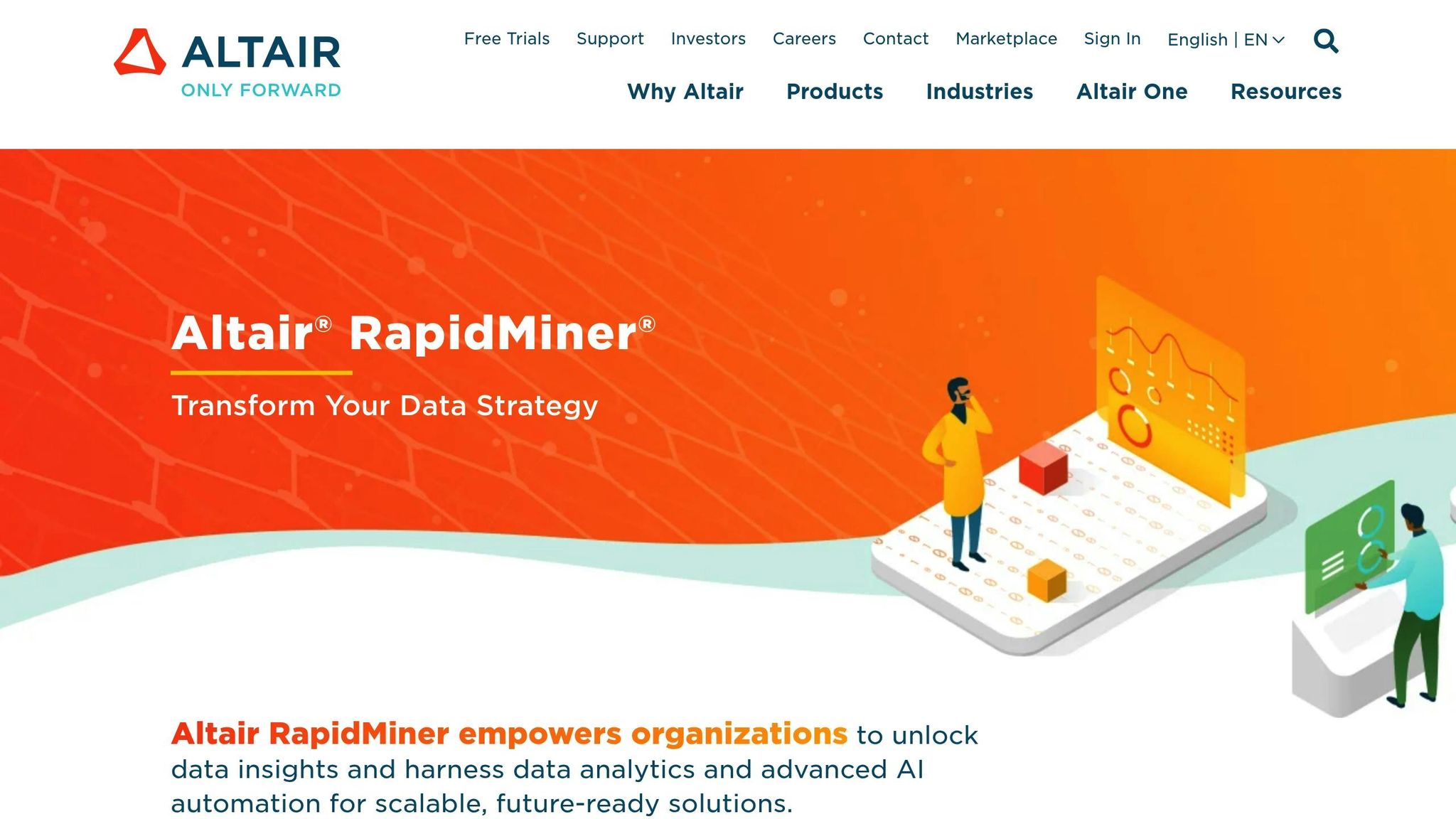
Altair RapidMiner is a powerful platform for data analytics and AI, designed to make sentiment analysis more accessible for small and medium-sized enterprises (SMEs). Its user-friendly design allows teams with varying technical expertise to create sentiment models quickly and efficiently, simplifying what can often be a complex process.
Streamlined Data Handling
RapidMiner shines in managing the entire data lifecycle for sentiment analysis projects. From acquiring and cleaning data to preparing it and generating models, the platform supports a wide range of tasks, including classification, regression, and predictive modeling. It connects effortlessly to databases, cloud services, and big data tools, enabling businesses to gather and process feedback seamlessly.
"Altair RapidMiner is easy to use and intuitive with no coding required, making it a low code tool."
- Sachin Jagtap, Senior Manager, Digitalization of Supply Chain & Traceability at a non-profit
Speed and Accessibility
With its drag-and-drop interface, RapidMiner makes sentiment analysis approachable for users without technical expertise. The platform automates tasks like tuning and feature selection, significantly reducing the time needed to build models. This is especially helpful for SMEs that need actionable insights quickly without dedicating large resources to AI development.
For instance, RapidMiner successfully predicted the sentiment of Lego reviews using cross-validation with SVM, demonstrating its ability to handle real-world sentiment analysis effectively.
Advanced AI Features
RapidMiner provides access to 450,000 generative AI models, giving businesses the flexibility to test and switch between different approaches. It supports both vector and graph-based retrieval-augmented generation, which enhances context retrieval. Additionally, built-in tools for fine-tuning and few-shot optimization allow teams to refine their models for better performance. This adaptability ensures businesses can tailor sentiment analysis to their unique needs.
"One of the most valuable features is the built-in data tuning feature. Once the model is built, we often struggle to increase its accuracy, but RapidMiner allows us to refine model accuracy."
- Gopi Manoj Vuyyuru, Technical Support Team Lead at HCLTech
Collaboration and Scalability
Beyond its ease of use, RapidMiner is designed to foster collaboration among team members, enabling businesses to scale their insights effectively. Teams can work together to analyze customer service call transcripts or online chat logs, uncovering public sentiment and identifying recurring issues.
Security and Data Protection
Data security is a key focus for RapidMiner. The platform incorporates an Identity Provider (KeyCloak) for secure operations, which includes centralized user management, Single Sign-On, role-based authorizations, and detailed session logging. This ensures that sensitive data remains protected and compliant with security standards.
Flexible Pricing and Market Standing
RapidMiner offers pricing options tailored to different business sizes. For smaller datasets (up to 10,000 rows), a freemium model is available, while paid licenses range between $5,000 and $10,000 USD annually. With a 14.1% mindshare in the Predictive Analytics category as of July 2025, RapidMiner has positioned itself as a go-to solution for businesses seeking straightforward yet effective sentiment analysis tools.
2. Google NLP API
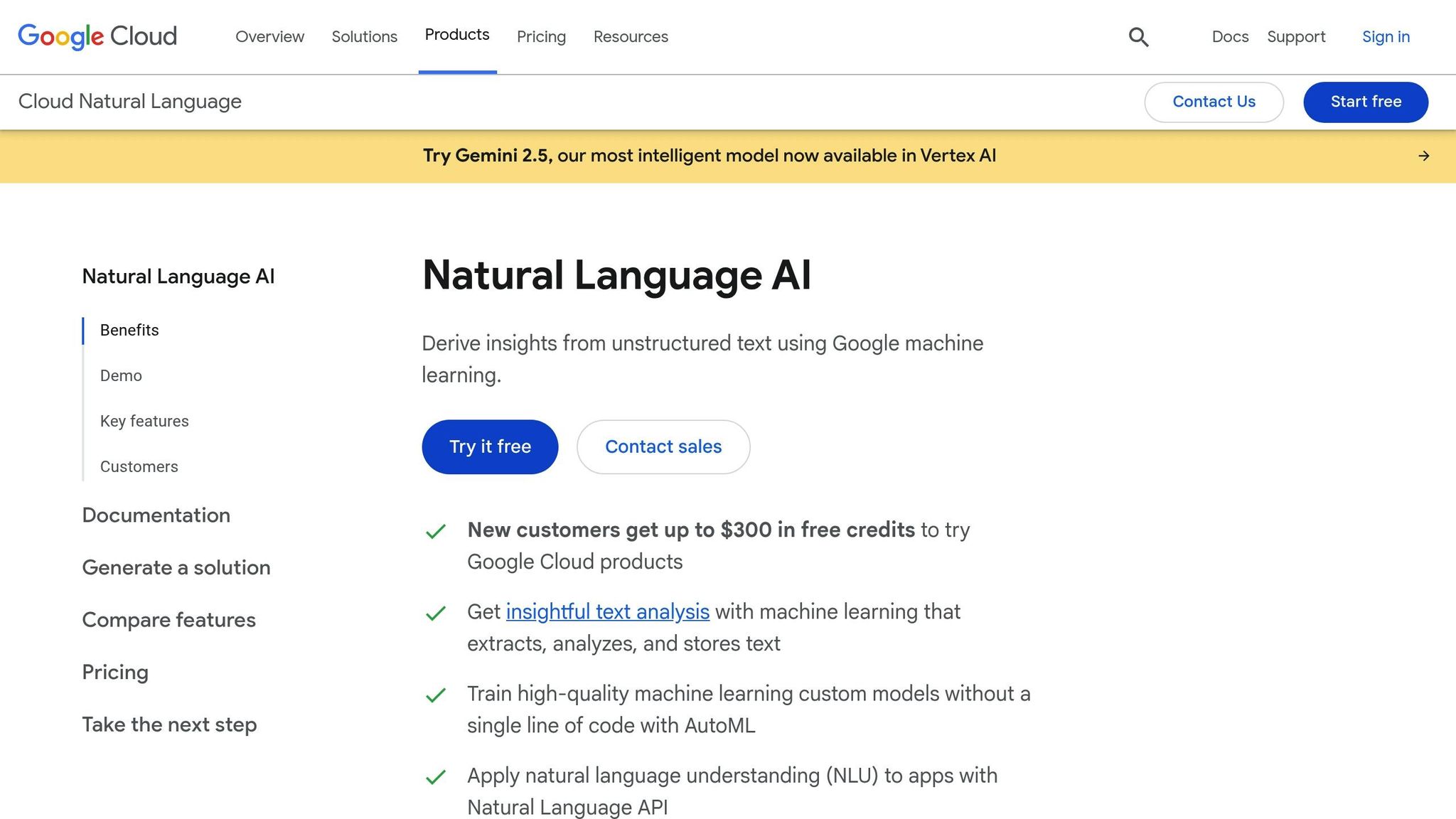
The Google Cloud Natural Language API is a powerful tool for sentiment analysis, especially for small and medium-sized enterprises (SMEs). Using machine learning, it interprets emotions in text and provides dual scoring, going beyond basic positive or negative classifications.
Detailed Sentiment Scoring
The API offers two key metrics: sentiment score (ranging from -1 to +1) and magnitude score, which measures the intensity of the emotion. This combination is particularly helpful for customer service teams. For example, a review with a sentiment score of +0.8 and a high magnitude indicates strong positive feedback, while a score of +0.2 with low magnitude may suggest a milder sentiment that could require a different type of response.
Multilingual Support for Broader Reach
The API supports ten major languages, including English, Spanish, French, German, Japanese, and more. This multilingual capability allows SMEs to analyze feedback from diverse markets without needing multiple tools. By covering a wide range of languages, the API simplifies global sentiment analysis and ensures consistent performance, as shown in benchmark studies.
Performance Insights
In a 2021 study on airline reviews, the Google Cloud NLP API achieved an impressive 73.4% accuracy rate, highlighting its reliability for business use. While accuracy can vary depending on the content type - 68.9% accuracy on airline reviews versus 42.6% on general tweets in a 2023 study - it consistently provides insights that businesses can act on.
Real-World Use Cases
Major media companies have successfully used the Google NLP API for fast and efficient content analysis. For instance, Meredith Digital utilized the API to classify text across its portfolio, significantly reducing processing time and identifying trends more quickly. Similarly, Hearst Newspapers used the API’s custom entity extraction feature in AutoML Natural Language to streamline its content processing workflows, regardless of the document source.
Easy Integration for Developers
The API’s REST interface makes it easy for development teams to integrate. Users can upload text data via API requests or use Cloud Storage for larger datasets. This flexibility allows businesses to analyze a variety of content, such as social media comments or customer service transcripts. Like other tools such as Altair RapidMiner, the Google NLP API prioritizes seamless integration for actionable insights.
Cost-Effective Pricing
New customers can take advantage of up to $300 in free credits, providing an opportunity to test the API’s capabilities before committing to a paid plan. This pricing structure is particularly useful for SMEs looking to evaluate its value without upfront costs.
Strong Security and Compliance
Google adheres to rigorous security standards, including ISO/IEC 27001, 27017, and 27018 certifications, and supports HIPAA compliance through Business Associate Agreements. Features like audit logging and identity access management ensure that businesses handling sensitive customer data can meet strict data protection requirements.
The API also includes AutoML Natural Language, which allows businesses to train custom models for specialized sentiment analysis. This is especially useful for industries where standard models may not fully meet specific needs. These features make the Google NLP API a versatile and reliable choice for businesses looking to enhance their sentiment analysis capabilities.
3. Amazon Comprehend
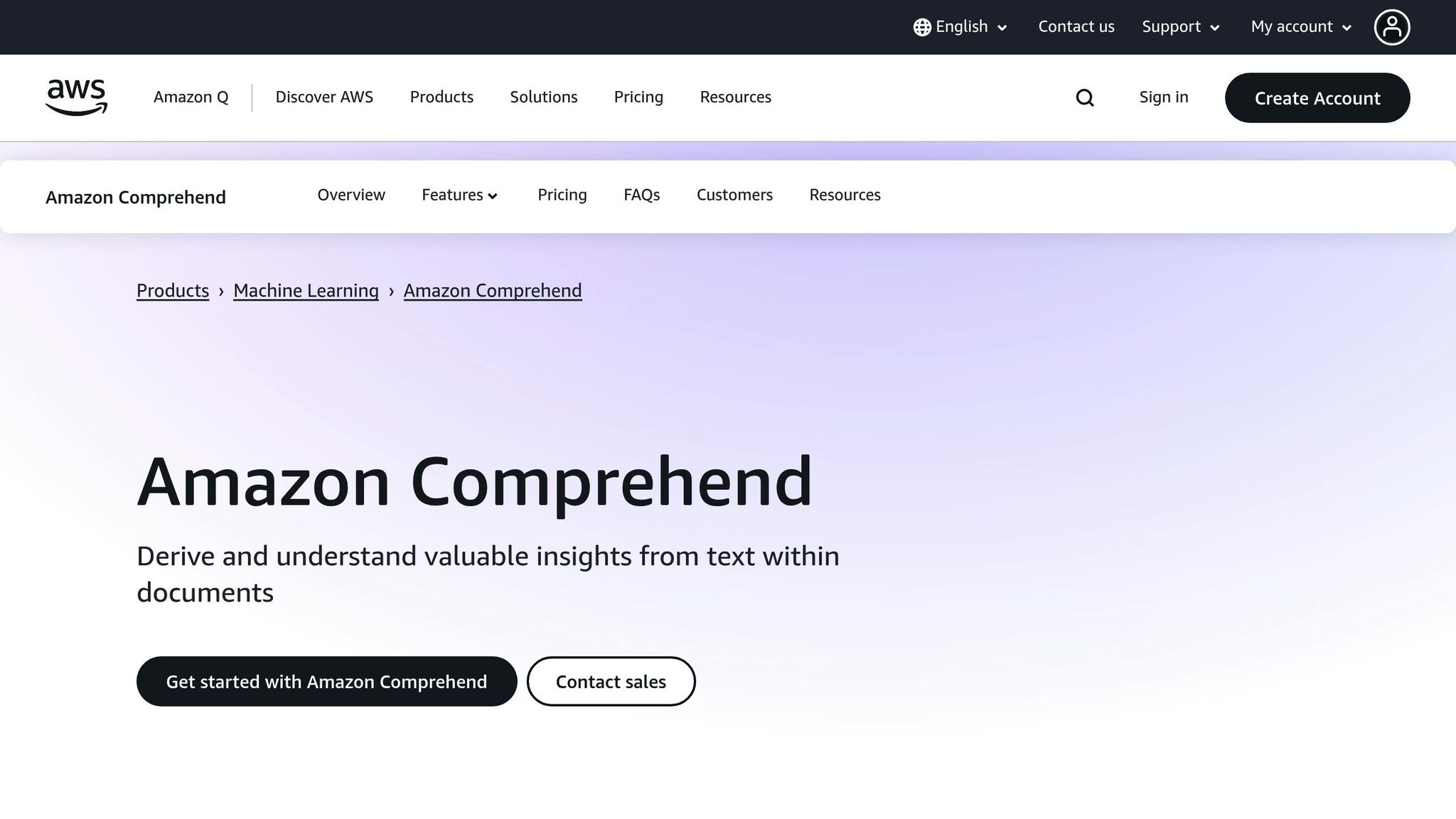
Amazon Comprehend is a natural language processing (NLP) tool designed to help businesses of all sizes gain deeper insights into customer sentiment. Powered by AWS, it provides sentiment analysis that supports practical business use cases, making it especially useful for small and medium-sized enterprises (SMEs) looking for actionable insights.
Advanced Sentiment Detection Capabilities
Amazon Comprehend can identify the emotional tone of a message as positive, negative, neutral, or mixed, and it assigns confidence scores to each classification. It also offers targeted sentiment analysis, which focuses on specific entities mentioned in the text, allowing businesses to understand how customers feel about particular products, services, or topics. This dual approach - general sentiment analysis and targeted insights - helps businesses process customer feedback more effectively and scale their operations accordingly.
Real-Time Processing and Scalability
The tool is built to handle diverse business needs with flexible processing modes. It supports both real-time and asynchronous analysis, accommodating everything from individual documents to large batches. Performance is measured in Inference Units (IUs), where one IU processes 100 characters per second. Auto-scaling ensures that capacity adjusts seamlessly as demand fluctuates, making it a scalable solution for businesses that need to analyze high volumes of data.
Practical Business Applications
Amazon Comprehend shines in analyzing customer feedback, support tickets, and social media comments. By processing this data, businesses can tailor responses more effectively and even anticipate customer needs. For example, understanding trends in customer reviews or support requests enables companies to make proactive improvements to their services. This approach eliminates personal bias, offering objective insights that lead to better decision-making.
Enterprise-Grade Security and Compliance
Security is a top priority for Amazon Comprehend, which adheres to AWS’s stringent compliance standards. These include PCI, FedRAMP, HIPAA, and GDPR certifications. Under AWS’s shared responsibility model, the cloud infrastructure is secured by AWS, while users are responsible for safeguarding their data. Detailed resources are available to help businesses maintain compliance.
Cost-Effective Pricing
Amazon Comprehend operates on a pay-as-you-go model, meaning businesses are only charged for the documents they analyze and any custom models they train. There are no upfront fees, and the pricing scales with usage. Additionally, it integrates smoothly with other AWS services, making it a flexible and cost-efficient choice for businesses.
4. Microsoft Azure AI Language
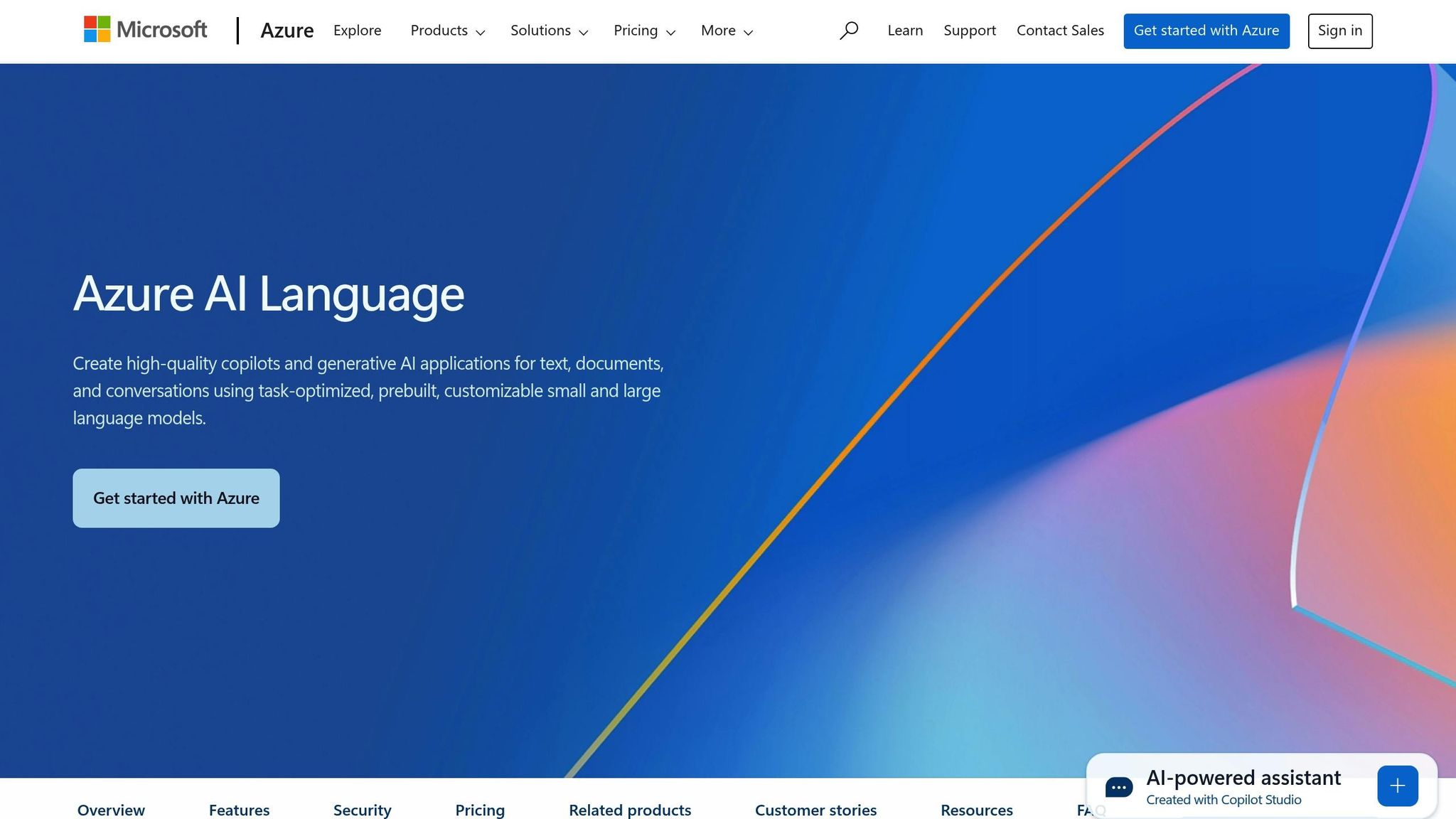
Microsoft Azure AI Language provides powerful tools for sentiment analysis and opinion mining, making it a valuable resource for small and medium-sized enterprises (SMEs) across multiple languages. With its dual-layer approach, broad language support, and integration with other Azure services, it offers businesses a detailed understanding of customer feedback. Let’s break down its key features and applications.
Dual-Layer Sentiment Analysis
Azure AI Language takes sentiment analysis a step further by combining basic sentiment classification with opinion mining. It doesn’t just label text as 'negative,' 'neutral,' or 'positive' - it also provides confidence scores to back up these classifications. The opinion mining feature digs deeper, identifying specific opinions about particular aspects within the text, offering a more nuanced view of customer sentiment.
Broad Multilingual Capabilities
With support for 94 languages, Azure AI Language is well-suited for global businesses. It allows companies to use pre-built models or train custom ones to meet their specific needs. The multilingual functionality is particularly impressive - it enables businesses to train a model in one language and apply it to others, provided the multilingual option is enabled during setup. Adding just 5% more training data in a target language can lead to noticeable improvements in performance.
Real-World Applications and Challenges
Azure AI Language excels in tasks like tracking trends, analyzing customer surveys, and enhancing engagement strategies. However, it’s not without its challenges. For instance, it may struggle with detecting sarcasm and tends to perform best when analyzing product reviews. To get the most out of the service, businesses should conduct thorough testing with their own data to fine-tune confidence score thresholds and ensure optimal results.
Security and Data Protection You Can Trust
Microsoft has made significant investments in cybersecurity - $20 billion and a team of 8,500 experts worldwide. Azure AI Language encrypts all customer data at rest and ensures processing occurs only within the designated deployment region. While data from synchronous or asynchronous calls may be stored temporarily (up to 48 hours) for debugging, businesses can opt out of this by setting the LoggingOptOut query parameter.
Flexible Pricing and Seamless Integration
Azure AI Language operates on a pay-as-you-go pricing model, charging based on the number of text records processed, training hours, and hosting costs. This structure makes it an attractive option for SMEs that want to scale their sentiment analysis efforts without hefty upfront expenses. Additionally, its smooth integration with other Azure products creates a unified ecosystem for businesses already leveraging Microsoft’s cloud services.
5. IBM Watson Natural Language Understanding
IBM Watson Natural Language Understanding (NLU) excels at uncovering deep insights from unstructured text. Powered by IBM's cloud infrastructure, this tool leverages advanced deep learning techniques to analyze text, extracting meaning, metadata, and emotional context. It’s especially useful for businesses aiming to dive deeper into customer feedback and communication patterns.
Advanced Sentiment and Emotion Analysis
Watson NLU goes beyond basic text analysis by offering a two-tiered approach to sentiment detection. It classifies sentiment (positive, negative, neutral) at both the phrase and document levels. But it doesn’t stop there - it also identifies specific emotions, such as joy, anger, sadness, and fear. This level of detail helps businesses understand not just the overall tone of customer responses but also the emotions driving those reactions.
"IBM Watson® Natural Language Understanding uses deep learning to extract meaning and metadata from unstructured text data. Get underneath your data using text analytics to extract categories, classification, entities, keywords, sentiment, emotion, relations and syntax." - IBM
Impact on Business Outcomes
Companies are already seeing tangible benefits from Watson NLU. For instance, Mushi Lab used it to power Clearscope, achieving a 15% month-over-month revenue increase. Major enterprises like UnitedHealth Group and Airbnb rely on Watson NLU to analyze employee feedback and monitor guest-host interactions in real time[32].
Flexible Plans for Different Needs
Watson NLU offers a range of pricing options to suit various use cases. The Lite plan is free and includes 30,000 monthly items along with one custom model - perfect for testing or small-scale projects. For larger needs, the Standard plan starts at $0.003 per item and supports up to 5 million items per month. Additional custom models, such as entity and relation models for $800 or classification models for $25, provide further flexibility.
Security You Can Rely On
When it comes to handling sensitive data, Watson NLU prioritizes security. It incorporates end-to-end encryption and strict access controls. The platform also complies with key regulations like GDPR and CCPA, making it a trusted choice for businesses working with customer data across multiple regions.
User Feedback and Market Reach
Watson NLU holds a 4.0/5 rating on SoftwareAdvice.com. Users praise its ease of use (4.3/5) and functionality (4.0/5), though some feel its value-for-money rating (3.3/5) could be better. Its user base spans various sectors, with 46% located in the United States and 22% in the Information Technology and Services industry.
The platform’s appeal cuts across industries like healthcare, finance, customer service, and e-commerce. Its seamless integration with other IBM Cloud services and support for custom models through Watson Knowledge Studio make it an attractive option for enterprises seeking an all-in-one text analytics solution.
sbb-itb-bec6a7e
6. Convin
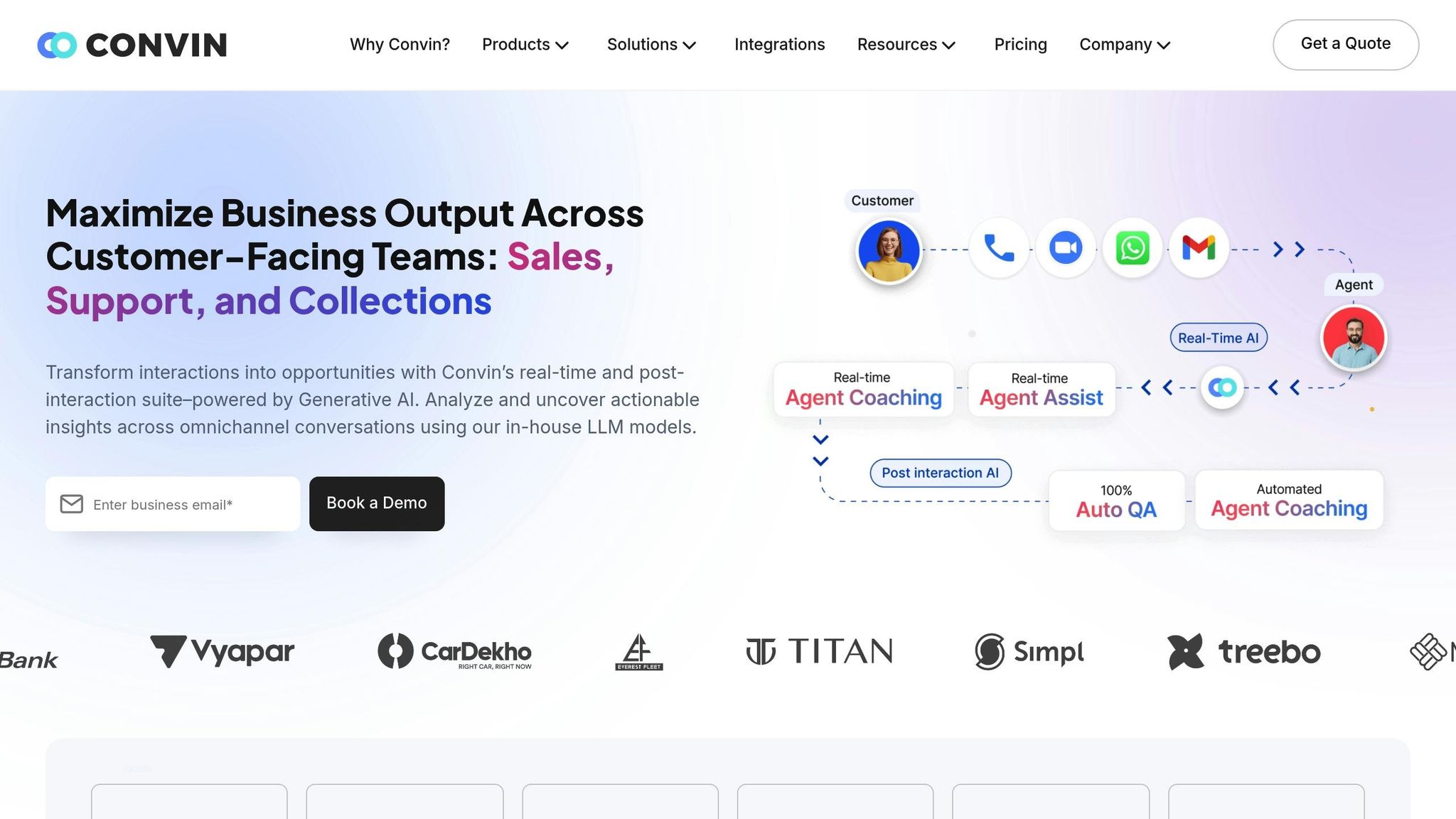
Continuing our review of top AI tools for sentiment analysis in 2025, Convin has made a name for itself with its focus on real-time customer conversation analysis. Launched in 2021 by IIT-Delhi graduates, Convin quickly became a go-to solution for businesses looking to analyze and optimize customer interactions as they happen [64,66].
Real-Time Conversation Intelligence
Convin processes calls, chats, and emails in real time, identifying emotional cues that help agents respond more effectively. This feature allows agents to receive live guidance during interactions, such as soft-skill suggestions, warnings, or rebuttal prompts tailored to the customer's emotional state.
Performance Metrics That Matter
The platform delivers measurable results, including:
- A 27% boost in CSAT (Customer Satisfaction Score)
- A 21% increase in conversions
- A reduction in handling time by 56 seconds
- A 25% improvement in customer retention
Multilingual Support and Compliance
Convin’s AI tools support over 70 languages, making it ideal for businesses with a global presence. It also adheres to rigorous privacy standards, including GDPR, CCPA, HIPAA, SOC 2 Type II, and ISO 27001 compliance, ensuring data security and trustworthiness.
Tailored for Small and Medium Enterprises
Designed with SMEs in mind, Convin integrates seamlessly with existing CRM and analytics tools, minimizing onboarding time and reducing costs.
"Convin ai not only offers manual auditing for all the calls but also automates the entire call auditing process for 100% customer conversations. It creates custom reporting and makes the overall manual QA more accessible. It saves me a ton of time by highlighting the weak and strong aspects of thousands of agents within minutes."
- Kanika S., Team Lead, AESL
Automated Quality Management
Convin significantly reduces the burden of manual quality management by automating 90% of the process. It generates coaching plans that speed up new-agent training by 60%, helping teams get up to speed faster.
User Experience and Ratings
With a 5.0 rating on Product Hunt (based on 8 reviews), users frequently highlight its intuitive design and versatile integration capabilities. The platform provides in-depth insights into customer interactions, offering detailed sentiment analysis and conversation metrics that help businesses run more efficiently.
"Convin ai has helped me and my team improve the overall quality aspect of our sales process. Ever since we started using Convin ai, we've seen great improvement in the call structure and call flow used by our agents."
- Samir A., Sales Team Lead
Flexible Pricing Options
Convin offers customized pricing plans tailored to business needs, with demos available upon request. Its scalable framework ensures that businesses can adjust their usage as they grow.
Convin’s real-time, multilingual capabilities make it a valuable tool for SMEs aiming to enhance customer engagement and streamline operations. Up next, we’ll look at more AI-driven tools that continue to push the boundaries of sentiment analysis for businesses.
7. Looka (via AI for Businesses)
Looka brings a fresh approach to sentiment analysis, offering tools tailored for SMEs through the AI for Businesses directory. With its robust data processing abilities, Looka helps businesses turn customer feedback into actionable insights.
Advanced Text Analysis for Businesses
Looka's sentiment analysis engine handles a variety of text sources, including customer reviews, surveys, social media mentions, and feedback. It can process vast amounts of text - up to hundreds of megabytes - in just minutes. This is especially valuable considering that 80% of data generated by businesses is unstructured, much of it coming directly from customers.
Real-Time Sentiment Tracking
The platform excels at real-time sentiment tracking, scanning social media, blogs, news, and reviews to classify mentions as positive, negative, or neutral. This immediate feedback is critical in an era where 70% of consumers expect brands to respond on social media within an hour.
Additionally, Looka goes beyond surface-level analysis by offering topic-level insights. This feature allows businesses to dive deeper into customer sentiment about specific aspects of their brand, products, or services.
Impact on Brand Reputation and ROI
The stakes are high - just one negative review on platforms like YouTube, Twitter, or Facebook can drive away about 30 potential customers. Businesses using Looka's AI-powered sentiment analysis tools report better customer engagement and improved brand reputation. The platform also provides a reputation score and visual sentiment insights, making it easier for businesses to understand and act on overall brand perception.
Use Cases Across Industries
Looka's tools serve multiple purposes:
- Brand Monitoring: Track reputation and address issues before they escalate.
- Competitive Research: Analyze how customers view competitors.
- Customer Service: Prioritize support messages based on sentiment, topic, and urgency.
- Product Analysis: Identify which features customers love and which need improvement by filtering feedback by topic and sentiment.
Making Sentiment Analysis Accessible
Available through the AI for Businesses directory, Looka is built for SMEs and growing companies in need of professional-grade sentiment analysis without the complexity or cost of enterprise tools. By applying consistent criteria, the platform eliminates human bias, ensuring more accurate insights. This accessibility levels the playing field, enabling smaller businesses to compete with larger organizations that have dedicated analytics teams.
Looka's tools make sentiment analysis a practical and efficient solution for businesses of all sizes, empowering them to transform customer feedback into meaningful business strategies.
8. Writesonic (via AI for Businesses)
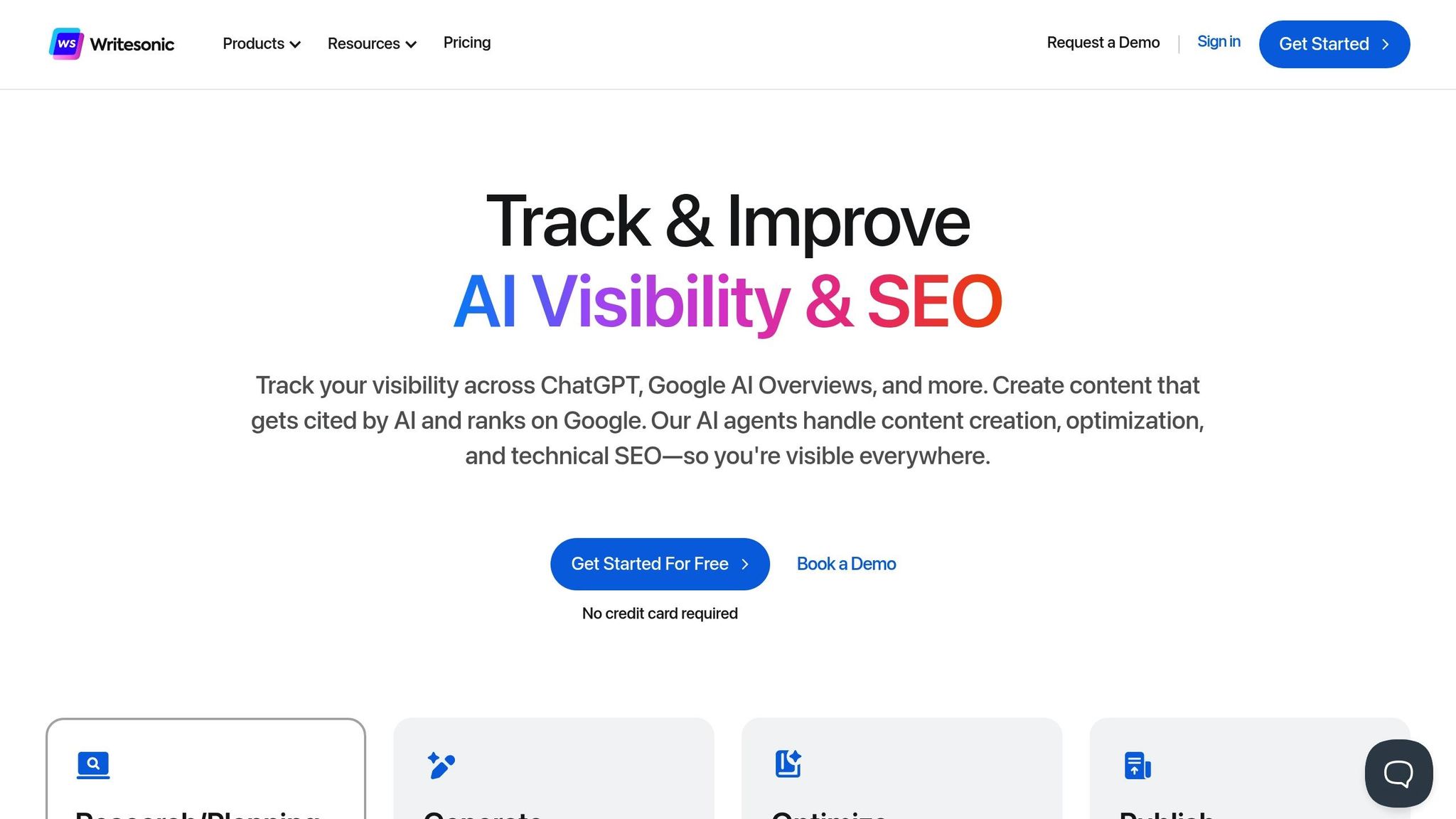
Writesonic rounds out our list, offering a robust AI-driven sentiment analysis tool tailored for small and medium-sized enterprises (SMEs) through the AI for Businesses directory. With its Chatsonic feature, the platform helps businesses quickly interpret customer emotions and refine their messaging.
AI-Powered Text Analysis and Processing
Writesonic's sentiment analysis engine dives deep into customer feedback gathered from surveys, social media posts, and reviews. It doesn’t just categorize feedback - it also provides instant suggestions to improve content based on emotions like frustration, happiness, or dissatisfaction. Using advanced natural language processing, the platform efficiently handles large volumes of feedback, giving businesses tools to measure public sentiment and monitor brand reputation at scale. One standout feature is its ability to refine messaging in real time, offering actionable recommendations to enhance tone and content effectiveness based on sentiment insights. This capability empowers businesses to make immediate adjustments that resonate with their audience.
Optimizing Support Strategies in Real Time
Writesonic shines in helping businesses adapt their customer support strategies on the fly. By analyzing sentiment, it enables companies to tweak communication styles to enhance user satisfaction. This is crucial, especially when 73% of customers remain loyal to brands with friendly customer service, and 80% are more likely to buy from brands offering personalized experiences. The platform’s Botsonic feature digs into customer feedback, uncovering valuable insights on preferences, pain points, and overall sentiment. As 95% of customer interactions are expected to be automated by 2025, tools like Writesonic become indispensable for maintaining strong customer relationships without sacrificing quality.
Real-World Business Benefits
Businesses can use Writesonic to identify key feedback trends - both positive and negative - and prioritize areas that impact customer perception the most. By focusing on high-impact insights, companies can allocate resources more effectively, addressing critical issues that drive loyalty and satisfaction. This approach not only enhances the customer experience but also streamlines operations by targeting what truly matters.
Affordable and Scalable for SMEs
Writesonic provides SMEs with a cost-effective way to access tools typically reserved for larger enterprises. By leveraging AI-powered sentiment analysis, businesses can cut customer support costs by up to 30%. The platform also helps refine employee training programs by using sentiment data to coach support teams on managing emotional triggers more effectively. This targeted training improves customer interactions, fostering stronger relationships and higher satisfaction rates. Writesonic’s combination of real-time analysis and affordability makes it a practical choice for growing businesses aiming to scale their operations efficiently.
Feature Comparison Table
Selecting the right sentiment analysis tool depends on your business goals, budget, and technical needs. Below is a detailed comparison of the eight tools we've discussed, highlighting features that are most relevant for small and medium-sized enterprises (SMEs).
| Tool | Data Types | Real-Time Analysis | Multilingual Support | Privacy Compliance | SME Suitability | Pricing Model |
|---|---|---|---|---|---|---|
| Altair RapidMiner | Text, Speech | Yes | 16+ languages | GDPR compliant | High | Subscription-based |
| Google NLP API | Text | Yes | 16 languages | GDPR, CCPA | High | Pay-per-use ($1–$2 per 1,000 characters) |
| Amazon Comprehend | Text | Yes | 12+ languages | SOC, HIPAA, GDPR | Medium | Pay-per-use |
| Microsoft Azure AI Language | Text, Speech | Yes | 100+ languages | GDPR, HIPAA, SOC | Medium | Pay-per-use |
| IBM Watson NLU | Text, Speech | Yes | 13+ languages | GDPR, HIPAA | Medium | Tiered pricing |
| Convin | Speech, Text | Yes | 20+ languages | GDPR compliant | High | Custom pricing |
| Looka | Text | No | Limited | Basic compliance | Very High | $20–$96/month |
| Writesonic | Text | Yes | 25+ languages | GDPR compliant | Very High | $10–$100/month |
Key Takeaways
- Accuracy: Tools like Google NLP API and IBM Watson NLU excel in precision, with IBM Watson NLU achieving up to 96% accuracy when using custom models. This level of accuracy is vital, especially considering that 71% of businesses see sentiment analysis as a key factor in understanding customer needs.
- Real-Time Analysis: Real-time capabilities are a game-changer for engaging customers proactively. Amazon Comprehend and Microsoft Azure AI Language are excellent examples of tools that enable this functionality.
- Multilingual Support: For brands with a global audience, multilingual support is crucial. Microsoft Azure AI Language leads the pack with support for over 100 languages. This feature is particularly valuable as over 80% of companies are expected to rely on social media to connect with their customers by 2025.
- Affordability for SMEs: Looka and Writesonic offer enterprise-grade features at accessible price points, making them attractive options for smaller businesses.
Most tools are GDPR-compliant and integrate seamlessly with CRM systems. Research shows that 75% of companies that align their sentiment analysis tools with CRM platforms report improved customer satisfaction.
As brand strategist Phil Pallen advises:
"Look at sentiment, reviews, mentions, and the tone of what's being said. I pay attention to patterns in feedback and how people respond over time. These signals help you understand what's working - and what needs to change!"
Pricing Models
Pay-per-use options, such as Google NLP API, are ideal for businesses with fluctuating usage needs, while subscription plans provide predictable costs. Custom pricing models, often used by enterprise tools, may be less suitable for SMEs with tighter budgets.
With the sentiment analysis market projected to reach $4.2 billion by 2025, choosing a tool that aligns with your data sources, volume requirements, and technical expertise is more important than ever. The right match can give your business a competitive edge in understanding and responding to customer sentiment.
Conclusion
Our deep dive into eight AI-powered sentiment analysis tools highlights how these solutions can help small and medium-sized enterprises (SMEs) unravel customer emotions and make informed decisions. Choosing the right AI tool for sentiment analysis has evolved into a crucial business decision, influencing customer satisfaction and brand reputation. With an astounding 98% of small businesses now using AI tools, the real question isn’t whether to adopt sentiment analysis technology - it’s about finding the solution that best aligns with your specific needs.
Consider this: 95% of consumers read reviews, and 58% are willing to pay more for top-rated products. By 2025, AI is expected to drive 95% of customer interactions. These numbers make one thing clear - understanding customer sentiment is no longer optional. It’s a must-have for businesses aiming to thrive in a competitive market.
SMEs face distinct challenges when navigating sentiment analysis tools, but there’s no shortage of options. Enterprise-grade solutions like IBM Watson Natural Language Understanding and Google NLP API offer robust accuracy and scalability. Meanwhile, tools like Looka and Writesonic provide accessible, feature-rich options that work well for smaller budgets.
Expert opinions reinforce this strategic approach:
"The landscape of artificial intelligence is constantly shifting, with a discernible trend towards more efficient, customised AI solutions that cater to the unique needs of small businesses."
- Ciaran Connolly, ProfileTree Founder
For SMEs, starting with built-in AI features is a smart way to ease into sentiment analysis before committing to more advanced enterprise tools. This gradual adoption not only helps teams adapt but also ensures smoother integration into existing workflows.
Platforms like AI for Businesses simplify the decision-making process by offering curated directories of AI tools tailored for SMEs. Instead of spending weeks sifting through endless options, business owners can quickly find solutions that meet their needs. This targeted approach saves time and minimizes the risk of choosing tools that are either too complex or incompatible.
From monitoring social media to analyzing customer reviews, the right sentiment analysis tool can completely transform how businesses understand their audience. Success lies in aligning your tool choice with your unique data sources, technical capabilities, and budget. With 85% of companies reporting improved customer insights through AI-powered sentiment analysis, the payoff is clear: better customer satisfaction, stronger brand protection, and sustainable business growth.
Start small, scale wisely, and let AI unlock the power of customer sentiment.
FAQs
How can I choose the best AI sentiment analysis tool for my business needs?
Selecting the right AI sentiment analysis tool depends on several factors, including your business size, objectives, and available resources. For small to medium-sized businesses (SMEs), it’s important to prioritize tools that are affordable, easy to use, and don’t require extensive technical knowledge. These options typically focus on simplifying setup and providing essential features like evaluating customer feedback or tracking social media sentiment.
On the other hand, larger enterprises might need platforms that can handle more complex datasets and offer advanced analytics. These tools often allow for greater flexibility and can integrate seamlessly with existing systems. When choosing a solution, think about your budget, the type of data you’ll be analyzing (e.g., text, audio), and how well the tool fits into your current workflows.
Matching the tool’s capabilities to your business goals ensures you get the most out of it, helping you make more informed decisions.
What’s the difference between real-time and asynchronous sentiment analysis, and how do they impact businesses?
Real-time sentiment analysis works by processing data instantly, enabling businesses to react to customer emotions as they happen. This approach shines in scenarios where immediate feedback is crucial, like live chat support or monitoring social media interactions. By addressing customer needs in real time, companies can enhance engagement, increase satisfaction, and even drive sales.
Asynchronous sentiment analysis, in contrast, focuses on collecting and evaluating data over an extended period. This method uncovers trends and patterns, making it ideal for tasks like refining marketing strategies or improving product lines. It’s a tool for businesses looking to make informed, long-term decisions based on comprehensive insights.
Ultimately, the choice between real-time and asynchronous sentiment analysis depends on your objectives. Real-time analysis is perfect for quick, agile responses, while asynchronous analysis supports more in-depth, strategic planning.
What steps can businesses take to protect data privacy and stay compliant when using AI tools for sentiment analysis?
To ensure data privacy and stay compliant when leveraging AI tools for sentiment analysis, businesses need to focus on transparency. This means clearly informing users about how their data will be used and securing their consent upfront.
Another key step is adopting data anonymization methods to protect sensitive information, such as personally identifiable information (PII), from exposure.
It's also critical to align AI practices with regulations like the GDPR and CCPA. This involves routinely reviewing data policies, collecting only the data that's absolutely necessary, and implementing secure storage measures to reduce potential risks.


